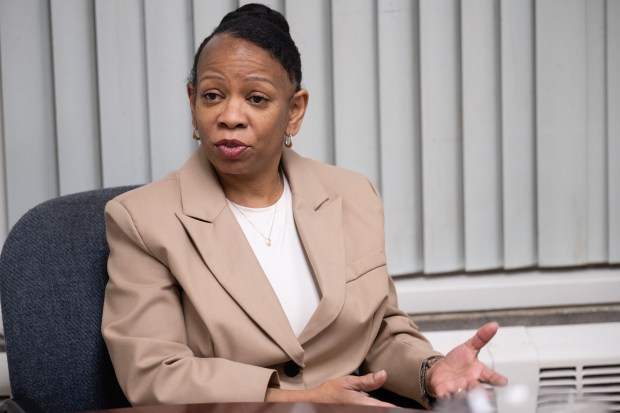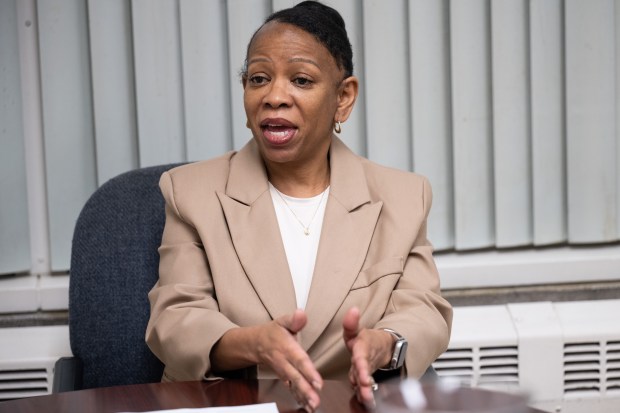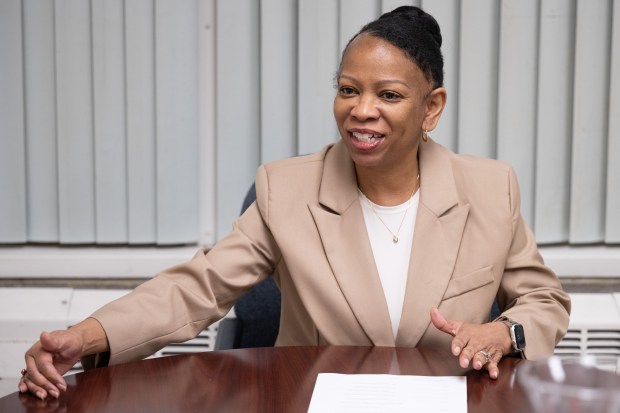A kindergarten physical may have changed the career trajectory for Dr. Janet Seabrook, just Gary’s second women health commissioner and the driving force behind the city’s first community health center for underserved residents.
Speaking last week at an office at the Gary Health Department, Seabrook still vividly recalls that interaction.
“That was my first true memory … he was our family pediatrician, and I was very interested in his stethoscope. He let me listen to my heart.”
Then, one day in kindergarten at Gary’s Douglass Elementary, teacher Finis Springer asked her students to stand up and state what they wanted to be when they grew up.
“I said ‘doctor’,” said Seabrook. “The boys laughed. They said ‘nurse’.”
She still remembers Springer’s words. “She held my hand and looked into my eyes and said, ‘you can be whatever you want to be’.”

Seabrook said her father John Seabrook, who worked at the former Budd Corp. metal stamping plant in Gary, wondered how he’d put the eldest of his five daughters through medical school, but supported her dream all the way, along with mom, Senella.
“My parents never really said no unless it was something outrageous or ridiculous,” Seabrook said.
Born in Charleston, S.C., young Janet Seabrook came to Gary when John Seabrook’s sister suddenly became a young widow. The family never left.

After graduation from Roosevelt High, Seabrook completed a biology degree at Tuskegee University in 1987 and received her medical degree from the Meharry Medical College in 1994 in Nashville.
After medical school, she completed her residency at Methodist Hospitals in Gary, becoming a family physician. She later earned an MBA from Purdue University Calumet in 2005. She’s studying for a master’s in public health now.
She also met her husband at Methodist. Dr. Augustine Izah, who also practices family medicine. The couple have two children: Justine, who also attended Meharry Medical College, is awaiting her residency placement. Son Austin is beginning his pre-med studies at Indiana University.
Shortly after completing her residency, Seabrook said the federal government named Gary as “the neediest U.S. city without a community health center.” She served on a Gary mayor’s task force in partnership with the Indiana State Department of Health, which identified the goal of launching a health center in Gary.
Seabrook wrote the grant and became CEO of Community Health Net in 1996 when it opened its first Gary location. She’s never had a private practice.
Today, there are eight Lake County locations served by about 25 doctors, nurse practitioners, a chiropractor and an optometrist.
“I think I was more shocked at first of how great the need was,” she said of those early years. “Not just health care. It was food, transportation, housing insecurity, just paying book rental. In Gary, particularly, we have a high rate of bankruptcy.”
Those barriers prevented residents from receiving health care for themselves and their families.
“That’s when I started reaching out to community partners,” she said. She worked out agreements with community farms for fresh vegetables, and with businesses for reduced lab fees and pharmaceutical companies. She wrote a grant for 100 car seats.
Community Health Net also partnered with Faith Farms, an east side Gary food and environmental justice organization that grows its own vegetables and advocates healthy eating practices.
When Mayor Eddie Melton began selecting his cabinet, he turned to Seabrook to succeed Dr. Roland Walker as health commissioner. She became just the second woman in the job and the first in 32 years.
Dr. Rebera Foston served in the role from 1988 to 1992.
Melton said he admired Seabrook’s experience and longevity in the community.
“Being in the legislature, I’ve seen a lot of issues I want to address like infant and maternal mortality. Our rates are the highest in Lake County in Gary, Hammond and East Chicago.
“As we grow our population, we need to have a healthy community, as well.”
Melton said he’s charged Seabrook with addressing the infant mortality issue, launching a senior citizen panel to advise him on health issues, and to support the mobile crisis team that was created in 2023 to respond to mental health situations.
Seabrook works alongside Veronica Collins-Ellis, the director who oversees day-to-day operations.
She said Community Health Net already has a program in place aimed at improving infant and maternal health. She said patients learn to take their own blood pressure and learn about sexually transmitted diseases, breast feeding and nutrition in a 10-session class. They also go to a hospital maternity ward and meet with nursing staff.
Seabrook said the program averages 175 graduates a year.
“I should be able to put that into action in public health and reduce infant mortality,” she said.
Carole Carlson is a freelance reporter for the Post-Tribune.




